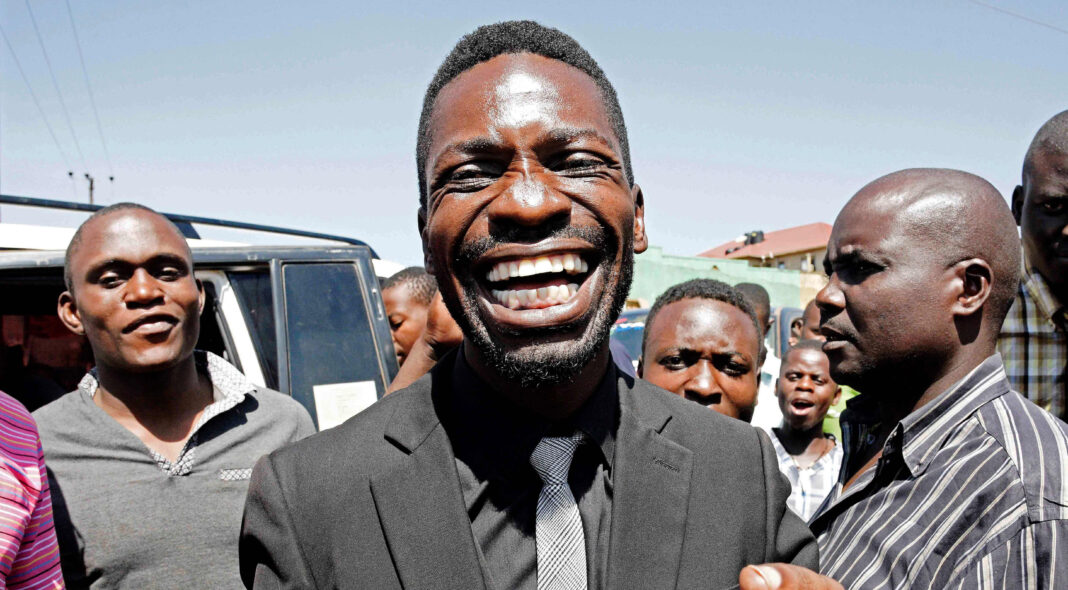The transition from music to politics isn’t renowned for yielding results but that certainly hasn’t deterred Bobi Wine: the 38-year-old reggae star running in the 2021 Ugandan Presidential elections. With somewhat more noble ambitions than Kanye, we explore the musical and political history of the man looking to bring President Yoweri Museveni’s 34 year tenure to an end.
Who is Bobi Wine?
Born Robert Kyagulanyi Ssentamu and raised in one of the Ugandan capital’s poorest slums, Bobi Wine calls himself the ‘Ghetto President’. His music career as an afrobeats and dancehall singer took off in the early 2000s with national hits like ‘Akagoma’ and ‘Funtula’ and he achieved international recognition thanks to a spot on Disney’s Queen of Katwe soundtrack in 2016 with the song ‘Kiwaanyi’.
When he turned to politics in 2017, it felt like a logical step for a musician whose lyrics had always touched upon issues of social injustice and poverty. “It’s as if I’ve been campaigning all my musical career,” he told the BBC. Wine became the leader of the National Unity Platform in 2020, proposing policies to radically improve the basic living conditions of Ugandans, provide equal access to health and education, tackle youth unemployment rates and restore the Presidential term limits, which were scrapped by the incumbent President in 2005. This platform has earned him swathes of support in the country, particularly amongst younger generations.
Who’s he up against?
Uganda’s current president Yoweri Museveni has ruled the country for 34 years. As an active participant in the overthrow of 70s dictator Idi Amin and the subsequent Ugandan Bush war, Museveni has often been credited with bringing stability to Uganda after years of brutal Civil War.
Museveni might even share Wine’s musical ambitions, having released ‘You Want Another Rap?’ in 2010 and reportedly offering his musical services to Kanye when he paid Uganda a controversial visit in 2018. Wine slated Kanye for the trip, calling it ‘immoral’, for while Uganda has seen relative peace for decades, Museveni’s rule has not been without its critics.
Notably, in 2014, he signed the Uganda Anti-Homosexuality Act into law (in its previous proposed iteration, homosexuality would have been punishable by death) until the Constitutional Court of Uganda declared the law invalid and two years ago, the President implemented a deeply unpopular social media tax, which many young Ugandans have boycotted on principle.
Wine has not shied away from vocally criticising his political opponent both in speeches and in song, using the hashtag #WeAreRemovingADictator to promote ‘Tulonde’. The song – which he calls “a clarion call” – paints a bleak and devastating picture: “Electoral commission don’t treat us the same…the opposition in jail they detain, many comrades are dead”.
What’s happened in the election so far?
Museveni has frequently been accused of utilising the military against his political opponents in the past and Bobi Wine is no exception. He has been arrested a number of times during his political career and one particular arrest last November provoked wide-scale protests, when state forces killed over 50 citizens. His own bodyguard was killed in December in a car accident involving a military police vehicle and Wine considers all these incidents as overt threats to his life and has taken to wearing a bulletproof vest on the campaign trail.
A government-sanctioned social media blackout has also caused widespread controversy and Museveni went one step further on the 13th January by shutting down access to the internet. Despite the pandemic, Ugandans have shown up in droves and masks to vote in these elections. As of Friday 15th January, Museveni has already been credited with a clear lead but Wine has disputed this, alleging that there had been voter fraud and encouraging Ugandans to exercise their right to protest. While final results are not expected until Saturday, the question of whether this truly was a free and fair election will linger on.


